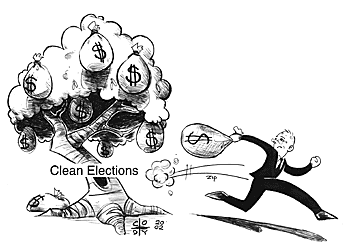
Illustration by Cody Angell
|
By Jason Baran
Arizona Daily Wildcat
Tuesday August 27, 2002
In 1998, Arizona voters experienced a moment of clarity that resulted in an electoral scheme that is as un-American as the hammer and sickle.
The so-called Clean Elections Act provides public funding for candidates running for elected office throughout the state. "Clean Elections" was ushered in under the presupposition that it would, by removing private donations from campaigns, instill in our elected officials a disinterested civic virtue reminiscent of the founding fathers'.
Instead, the misnamed act is an insult to the free market, the very foundation of the American experience. America's market economy is based on entrepreneurship; we are successful as a nation because people are free to generate capital for a cause. Investment is risky and there is no guarantee of success. Success is the product of hard work, luck and the trust of one's investors ¸ those persons of like mind who saw it fit to hand over their hard-earned money in the pursuit of a common goal. The benefits of that success go not only to those who invested directly, but also to the economy as a whole, even those who invested in losing efforts. The system prospers because someone has something to lose.
Public financing takes away the incentive for hard work. It is, I understand, hard work to raise money. It doesn't grow on trees and people don't like to just hand it over to a stranger. A candidate and his staff have to convince people that he's the right person for the job, that he is of like mind and believes many of the same things they believe.
It parallels closely what companies have to do to generate capital to do business. They work to convince people that the company is the best in the business. Yes, Clean Elections campaigners are required to go out and get a couple thousand $5 donations to qualify for funding. But there is a great deal of difference between a $5 and a $100 donation. The level of commitment required to solicit ¸ and, conversely, donate ¸ $5 is greatly different than it is for $100 or even $20 for that matter.
Public financing fails us again in a more profound way. It contains a provision for funding from the state to help eliminate the gap between publicly funded candidates and those who make the effort to not burden the taxpayers. So, after candidate A discloses his contribution, candidate B gets a big fat check for doing nothing ¸ all courtesy of Joe Taxpayer.
Supporters of public financing have legitimate concerns about corruption and malfeasance, but the dismantling of the free market and our rights is no way to catalyze legitimate, meaningful change. Donations should be made public; after all, if one is committed enough to spend a lot of money on something, one should probably be willing to admit it. This keeps the system open and subject to constructive criticism by citizens and the press.
If the state is permitted to control funds, the next logical step is to determine
who gets funds ¸ and that is, in effect, a determination of who is allowed to run. The state eliminates the citizens' right to choose its leaders. This command and control has a familiar and unsettling ring. During this difficult financial time Arizona is shackled with an election law that drains millions from the state's coffers. Through July of this fiscal year the Clean Elections commission has given away nearly $3.7 million to candidates ¸ and that number will grow significantly during the last weeks of the primary season and during the general campaigns.
Two of the three Republican candidates for governor took public financing. By acting as free riders on the hard work of the third candidate, they have consumed $775,000 taxpayer dollars each. When was the last time you were given a bonus for the work your colleagues do? The Democratic candidates complain about corporate welfare, but what about political welfare? There are no complaints from them while their personal campaigns cash taxpayers' checks. One even uses the program as the crux of his platform. So much for being the working man's party.
As the primary and general elections near, it would be worthwhile to make a note of candidates' acceptance of public funds to support their personal political careers. John F. Kennedy said that Americans "do things not because they are easy, but because they are hard." Acceptance of public funds demonstrates an aversion to personal responsibility ¸ to the hard work that embodies the American experience.

